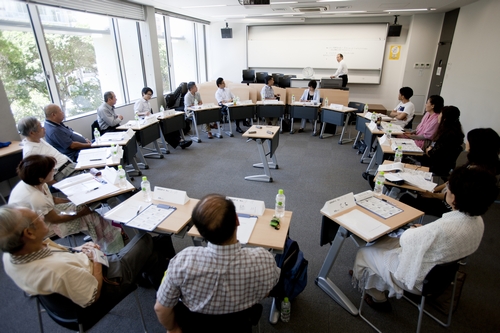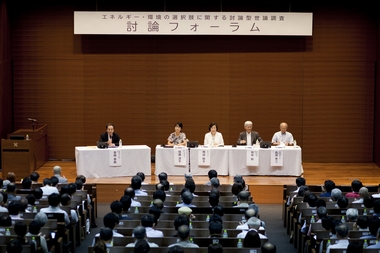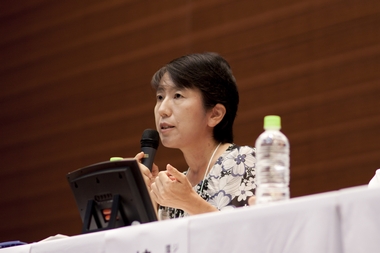September 18, 2012
Update on the Discussion in Japan on Energy and Environment Policy Options to 2030
Keywords: Newsletter
JFS Newsletter No.120 (August 2012)

As we reported in our February and May issues, the process to determine energy policy that will guide the country up to the year 2030 is currently underway in Japan, including a debate over the level of dependence on nuclear power as part of the energy mix.
Japan's Strategic Energy Plan under Review after 2011 Nuclear Disaster
Re-Examining GDP Growth Projections to Plan Japan's Future Energy Policy
At the end of May 2012, the Fundamental Issues Subcommittee of the Advisory Committee for Natural Resources and Energy, of which I am a member, submitted its proposed energy mix options to the Energy and Environment Council (EEC), which consists of cabinet members. Based on the subcommittee's proposal and others submitted by the Japan Atomic Energy Commission and the Central Environment Council, the EEC decided on its final direction for Japan's future energy mix and presented three options to the public at the end of June.
At this point, the issue has moved to the phase of a "national discussion," with the aim of deciding on the future direction of Japan's future energy policy by the end of August 2012, which took form in three main approaches: the public input system to broadly collect opinions and comments from the general public, public hearings that were held in 11 locations nationwide, and a new approach called a "deliberative poll."
Public comment systems have been used gathering people's opinions through the Internet, fax, postal mail, and so on, not only on energy policies but also when the government needed to decide on other important policies. However, most people are not aware that they have the opportunity to express their opinions during a public comment period, which means that their opinions are not taken into account. On particularly controversial policies where there is a range of sharply divided opinions, comments from the public tend to come mostly from either those in support or those opposed. For issues where the business world strongly opposes measures, such as the fight against global warming, some industry organizations have been criticized for submitting thousands of identically- worded letters to the government through the public comment system.
The initial deadline for public comment on energy policies was the end of July 2012, but it was extended to August 12 because of mounting complaints that one month was too short. Generally, a thousand submissions is considered a good level of response. This time, the government received over 80,000 responses, a clear sign of the high level of public interest in this issue.
Public hearings have been held in the past in many locations around the country, as part of the conventional process of policy discussion, but they have often been criticized as being nothing more than sessions to brief the public on pre-determined policies, rather than hearings aiming to incorporate public opinion into policies. Many sensed that the government had little intention of reflecting the voices of the people in policy making processes. One could say that because energy is a complex topic, the government typically determined its energy policies by listening to the experts and government officials, rather than to laypersons.
In response to the growing public interest, hearings on Japan's future energy policy were held in 11 locations around the country, including in Fukushima Prefecture where the disaster occurred at one of Tokyo Electric Power Company's nuclear power plants. At ten of the public hearings (all but Fukushima), a total of nine people were selected at random from among those registered to speak, but this number consisted of three persons each who had indicated they supported one of three nuclear energy mix scenarios for 2030 presented by the government: zero dependence on nuclear, 15-percent dependence, or 20 to 25 percent dependence.
After a few public hearings, however, it turned out that 70 percent of the people who had registered to speak supported the option of zero- percent dependence on nuclear power. With this being the case, people realized that the chance of being selected to speak will vary greatly depending on which option they chose to support. In response to criticism, half way through the process, the government raised the total number of speakers per meeting from nine to 12 by mainly increasing the number of those representing the supporters for the zero-dependence option. The government also decided to take a more flexible approach, such as hearing opinions about the nuclear dependence ratio besides only the three options it presented.
Other "irregularities" resulted in more changes to the process. At the public hearing in Sendai City, the head of the planning department of Tohoku Electric Power Co. said, "I will summarize my company's stance," and continued, "The 20 to 25 percent nuclear option is closest to my company, Tohoku Electric Power's opinion." At the public hearing in Nagoya, a chief of the nuclear power department of Chubu Electric Power Co. said, "No-one has died directly from the effects of the radiation. I would have chosen 35 percent if there was a 35-percent scenario, and 45 percent if there was a 45-percent scenario, because that is safer." Since persons in favor of nuclear power like them expressed their opinions at public hearings, the government was accused of manipulating the choice of speakers. As a result, the government decided to prohibit employees of electric power companies and their related companies from expressing their opinions at public hearings.
At the public hearing held later in Osaka, when three persons were selected from 67 who supported the 20 to 25 percent option and wanted to express their opinions, it turned out that two of them were employees of the Kansai Electric Power Co. Even after those two were excluded and two were newly selected, one of them was found to be an employee of a company affiliated with Kansai Electric Power. At the hearing in Sapporo, too, an employee from a company affiliated with an electric power company was selected, but the chair of the meeting asked him to withdraw.
The general public was not aware of the hearings when they first started, but that changed when these incidents hit the headlines. In responding to public criticism, the government was forced to take action to ensure the public comment system was not discredited, and Yukio Edano, the Minister of Economy, Trade and Industry, through an administrative guidance, called on the electric power companies and their affiliates to refrain from organized participating in the public comment system.
What is the third type of the national discussion being used, the technique called "deliberative polling"? This type of polling was first advocated by Professor James S. Fishkin of Stanford University in the United States in 1988, and it's based on the observation that "in conventional opinion polls, respondents tend to answer questions based on the opinions of politicians they have seen on television or their impressions of newspaper headlines, since people are not very interested in politics and government policy." This polling method is aimed at obtaining well-thought-out responses as a result of deliberation by having respondents read well-balanced information on an issue, pose questions to experts who have opposing opinions, and then discuss the issue adequately."

More specifically, ordinary citizens randomly selected are first polled on the targeted issues and some of them are chosen to be participants in a discussion forum. They are given information on the issues in advance. At the forum, they have small group discussions and then a general assembly where they can ask experts questions developed in the small group discussions. After the discussion forum, the participants are again polled on the same issues and the resulting changes in responses are analyzed.
In other countries, since the world's first deliberative poll (on crime) was conducted in the United Kingdom in 1994, deliberative polls have been conducted on various subjects. A deliberative poll conducted in the United States in Texas in 1996 to 1999 on energy-mix options is frequently cited as an example. After the discussion forum of the poll, the percentage of the respondents who said they do not mind a rise in electricity costs due to subsidies for wind generation increased from 50 percent to 80 percent.
Deliberative polls have been conducted in Japan several times, but this may be the first time in Japan, perhaps even in the world, that this type of the poll was conducted as part of a decision-making process conducted by the national government. In this deliberative poll, an expert committee to provide opinions and advice on the subject from the experts' point of view was established in order to prepare materials for discussion and questions of the poll. I acted as a member of the committee and as an expert also answered questions from small groups at the discussion forum.

The recent deliberative poll was made up of (1) a phone survey of about 3,000 randomly selected men and women aged 20 and over in Japan, and (2) a two-day debate forum, attended by almost 300 people who responded to the phone survey. In an attempt to identify the trends of well-considered opinions, three separate surveys were conducted: a phone survey and questionnaire surveys before and after the debate forum.
The results showed that the percentage of people who support the zero- nuclear scenario rose from 32.6 percent in the phone survey to 46.7 percent in the survey after the debate. Meanwhile, the percentage of respondents who support the 15-percent scenario decreased from 16.8 percent to 15.4 percent, and those who support the 20- to 25-percent scenario remained unchanged at 13 percent.
When asked what issue is most important in energy choice, as high as 80.7 percent answered "safety," well above the 15.8 percent support for a stable supply, the 2.1 percent for generation costs, and the 1.1 percent for global warming prevention. Keio University professor Yasunori Sone, who chaired the committee responsible for the deliberative poll, after analyzing the outcome, said that the reason why an increasing number of people supported the zero-nuclear option is that many were not convinced through discussions or by the explanations of nuclear experts, in terms of the safety of nuclear power generation.
Of course, all of the recent hearings, public comment surveys, and deliberative polls have room for improvement in their operating methods, but their basic direction is the right way to go. They are aiming to accurately reflect public opinion on policy. The government has called for citizens to share their ideas on how to improve the operating methods to better proceed in the right direction, instead of disallowing such surveys when they do not work well.
The next step is to organize the vast amount of opinions gathered and then reflect them in policy. The National Strategy Minister, Motohisa Furukawa, announced that in order to properly organize the opinions he would establish a review committee, including statisticians and media personnel, to analyze and verify the results of the recent surveys. The establishment of this committee may be aimed at deflecting criticisms that the government fabricated its own conclusions, and the process was manipulated, and so on.
Figuring out how to incorporate the results of public input into policy is another difficult task for the government. It is impossible to satisfy all citizens, and the public has expressed growing concern over nuclear power, so the government at least needs to boost transparency of the results of reflecting public opinion and transparency of the process if it wishes to avoid the criticism that in former consultation processes the government just pretended to listen to the public.
Opinion polls conducted by the media show that, while many citizens support the zero-nuclear scenario, the business sector -- Japan Federation of Economic Organizations, Japan Association of Corporate Executives, and Japan Chamber of Commerce and Industry -- is aligned to strongly oppose the zero-nuclear scenario. They claim that without nuclear power electricity costs will go up, forcing many Japanese companies to transfer their production bases overseas, and eventually leading to the "hollowing" of Japanese industry. Recently, the government decided to exclude employees of power companies as speakers at the hearings, in response to public criticism over their participation. However, considering the fact that employees in the industrial sector are also citizens and are supposed to have the right to participate in the hearings, it is also a big challenge for the government to bridge the gap.
It is known that Germany established an ethics committee just after Japan's March 11 disaster and that the nation was quick to decide to phase out nuclear power generation. I heard that the nation's quick decision was made possible because of 20 years of communication and debate between the national government and the public. Likewise, I also learned that Sweden reached a decision on the location of final nuclear waste storage sites as a result of its government's continuous and careful communication and debate with local people over a 30-year period.
Not many Japanese citizens up to now have shown deep interest in and been actively involved in policy on energy and other important topics. I hope that the national debate over energy policies in the wake of the Fukushima nuclear accident will continue and be improved, even after the Japanese government reaches a conclusion on this policy. I also strongly hope that these debates will serve to shift people from being "citizens who leave policymaking to the government but then complain about it" to "involved and thinking citizens," as envisioned by Japanese sociologist Shinji Miyadai.
Written by Junko Edahiro
Related
"JFS Newsletter"
- 'Good Companies in Japan' (Article No.4): 'Eightfold Satisfaction' Management for Everyone's Happiness
- "Nai-Mono-Wa-Nai": Ama Town's Concept of Sufficiency and Message to the World
- 'Yumekaze' Wind Turbine Project Connects Metro Consumers and Regional Producers: Seikatsu Club Consumers' Co-operative
- Shaping Japan's Energy toward 2050 Participating in the Round Table for Studying Energy Situations
- 'Good Companies in Japan' (Article No.3): Seeking Ways to Develop Societal Contribution along with Core Businesses


